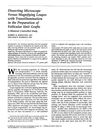 25 citations,
August 1998 in “Dermatologic Surgery”
25 citations,
August 1998 in “Dermatologic Surgery” Dissecting microscopes give more and better quality hair grafts than magnifying loupes.
 21 citations,
September 2008 in “Magnetic Resonance Imaging”
21 citations,
September 2008 in “Magnetic Resonance Imaging” MRI can effectively image skin structures noninvasively.
 20 citations,
June 2016 in “Magnesium research”
20 citations,
June 2016 in “Magnesium research” Hair follicles help magnesium get through the skin more effectively.
 16 citations,
October 2004 in “Acta dermato-venereologica”
16 citations,
October 2004 in “Acta dermato-venereologica” Two people lost a lot of hair because of epilepsy drugs, but their hair grew back after changing medication.
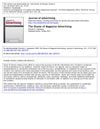 9 citations,
March 1981 in “Journal of Advertising”
9 citations,
March 1981 in “Journal of Advertising” Magazines should self-regulate and collaborate to stop deceptive ads and protect consumers.
 6 citations,
July 2009 in “Biomolecules & therapeutics”
6 citations,
July 2009 in “Biomolecules & therapeutics” Combining MSM with MAP significantly promotes hair growth.
 4 citations,
October 2022 in “Journal of Biomedical Materials Research Part A”
4 citations,
October 2022 in “Journal of Biomedical Materials Research Part A” Magnesium oxide-infused membranes help heal wounds faster by reducing inflammation and promoting skin and hair follicle growth.
 3 citations,
July 2022 in “Dermatologic Therapy”
3 citations,
July 2022 in “Dermatologic Therapy” Magnesium microneedle patches can safely improve under-eye wrinkles when used every other night for 12 weeks.
 2 citations,
August 2019 in “Turkish Journal of Chemistry”
2 citations,
August 2019 in “Turkish Journal of Chemistry” Researchers made minoxidil efficiently using cobalt ferrite nanoparticles as a reusable catalyst.
 2 citations,
August 2022 in “Reproductive Biology and Endocrinology”
2 citations,
August 2022 in “Reproductive Biology and Endocrinology” Magnesium supplements improved quality of life for women with polycystic ovary syndrome, but didn't help with acne, hair loss, or abnormal bleeding.
 2 citations,
June 2020 in “Skin Research and Technology”
2 citations,
June 2020 in “Skin Research and Technology” MRI reveals thinner scalps and smaller hair follicles in people with androgenetic alopecia.
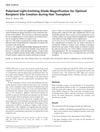 1 citations,
March 2006 in “Dermatologic Surgery”
1 citations,
March 2006 in “Dermatologic Surgery” Using a polarized LED magnifier during hair transplants makes creating recipient sites easier and may increase hair density.
 1 citations,
July 2023 in “Cytotherapy”
1 citations,
July 2023 in “Cytotherapy” Magnetic nanovesicles from stem cells can improve hair growth by staying in the skin longer.
 1 citations,
August 2022 in “Chemical engineering journal advances”
1 citations,
August 2022 in “Chemical engineering journal advances” Scientists made human hair magnetic by coating it with special nanoparticles.
1 citations,
August 2021 in “Medical Science Monitor” Male and female hair loss have different genetic causes.
 1 citations,
June 2019 in “Current developments in nutrition”
1 citations,
June 2019 in “Current developments in nutrition” A combination of arginine silicate complex and magnesium biotinate improves hair and nail growth in rats.
 May 2024 in “Journal of trace elements in medicine and biology”
May 2024 in “Journal of trace elements in medicine and biology” Overweight or obese women before pregnancy have lower iron levels in their serum and hair during early pregnancy.
 January 2024 in “Biological trace element research”
January 2024 in “Biological trace element research” Isotretinoin affects trace element levels and requires monitoring of liver and kidney functions.
 December 2023 in “Archives of iranian medicine”
December 2023 in “Archives of iranian medicine” Higher iron levels in hair may increase the risk of esophageal cancer.
 November 2023 in “Cureus”
November 2023 in “Cureus” Magnetized saline water lotion increased hair growth in men with hair loss.
 November 2023 in “Advanced functional materials”
November 2023 in “Advanced functional materials” Magnesium Silicate Sprays help heal burn wounds and regrow skin features better than commercial products.
 November 2022 in “The Caucasus”
November 2022 in “The Caucasus” The document's conclusion cannot be provided because the content is not in a readable format.
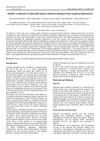 December 2019 in “Drug Analytical Research”
December 2019 in “Drug Analytical Research” Magistral pharmacies had issues with production quality and dosage accuracy.
 April 2018 in “Journal of Investigative Dermatology”
April 2018 in “Journal of Investigative Dermatology” The conclusion is that a new method combining magnetic tweezers and traction force microscopy may help understand skin cell interactions and diseases.
 32 citations,
April 2000 in “Dermatologic Clinics”
32 citations,
April 2000 in “Dermatologic Clinics” Skin diseases, especially psoriasis, greatly affect people's quality of life, similar to chronic diseases.
12 citations,
August 2013 in “Journal of Dermatological Science” The MAGE3 hypothesis for alopecia areata did not lead to a significant breakthrough.
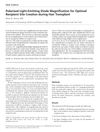 5 citations,
September 2005 in “Dermatologic Surgery”
5 citations,
September 2005 in “Dermatologic Surgery” Using a polarized LED magnifier during hair transplants eases recipient site creation and reduces eye strain but doesn't improve graft creation or placement.
 February 2025 in “Pharmaceuticals”
February 2025 in “Pharmaceuticals” Myo-inositol with magnesium effectively reduces acne and hirsutism in PCOS patients without side effects.
8 citations,
October 2020 in “Clinical Psychopharmacology and Neuroscience” rTMS may help treat trichotillomania in some patients.
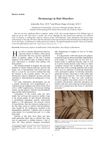 4 citations,
September 2012 in “Journal of Nanoscience and Nanotechnology”
4 citations,
September 2012 in “Journal of Nanoscience and Nanotechnology” Dermoscopy helps dermatologists diagnose different types of hair loss accurately without always needing a biopsy.



























